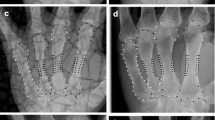Abstract
Determination of change in bone mineral density (BMD) requires high-precision densitometry techniques. The purpose of the study is to investigate to what degree different densitometer phantoms reflect observed changes in human BMD and to investigate to what degree fluctuations in densitometers’ measurement level influence bone loss estimates. Densitometer influence was assessed using the aluminum forearm phantom (AFP) provided by the manufacturer, the European forearm phantom (EFP) of semi-anthropomorphic calcium-hydroxyapatite, and repeated population measurements on different densitometer combinations. The mean follow-up time was 6.4 years (SD 0.6). Measured population bone loss varied from 4.6%/year to 3.2%/year, depending on densitometer combinations. These variations could not be explained by differences in sex, age, height, weight and baseline BMD. They were predicted by EFP measurements, but not AFP measurements. The EFP measurements indicate that X-ray tube replacement changed the densitometers’ measurement level in one of three instances, whereas “wear and tear” did not. We used the EFP data for adjustment of the densitometers’ measurement levels. After adjustment, the overall crude bone loss was reduced from 4.14% to 3.92%. Mean annual loss was reduced from 0.64% or 0.61%. We conclude that densitometer performance might influence the accuracy of bone loss estimates. Changes in performance are not detected by aluminum phantoms. Quality control of BMD measurements in longitudinal studies should be performed with anthropomorphic calcium-hydroxyapatite phantoms in order to detect possible differences between the participating densitometers’ measurement levels.



Similar content being viewed by others
References
(1993) Consensus development conference: diagnosis, prophylaxis, and treatment of osteoporosis. Am J Med 94:646–650
Melton LJ III, Khosla S, Atkinson EJ et al (2000) Cross-sectional versus longitudinal evaluation of bone loss in men and women. Osteoporos Int 11:592–599
Gluer CC, Faulkner KG, Estilo MJ et al (1993) Quality assurance for bone densitometry research studies: concept and impact. Osteoporos Int 3:227–235
Gluer CC, Blake G, LuY et al (1995) Accurate assessment of precision errors: how to measure the reproducibility of bone densitometry techniques. Osteoporos Int 5:262–270
Heilmann P, Wuster C, Prolingheuer C et al (1998) Measurement of forearm bone mineral density: comparison of precision of five different instruments. Calcif Tissue Int 62:383–387
Gluer CC (2000) The use of bone densitometry in clinical practice. Baillieres Best Pract Res Clin Endocrinol Metab 14:195–211
Faulkner KG, McClung MR (1995) Quality control of DXA instruments in multicenter trials. Osteoporos Int 5:218–227
Lenchik L, Kiebzak GM, Blunt BA (2002) What is the role of serial bone mineral density measurements in patient management? J Clin Densitom 5 [Suppl]:S29–S38
Marshall D, Johnell O, Wedel H (1996) Meta-analysis of how well measures of bone mineral density predict occurrence of osteoporotic fractures. BMJ 312:1254–1259
Eastell R (1996) Forearm fracture. Bone 18:203S–207S
Siris ES, Miller PD, Barrett-Connor E et al. (2001) Identification and fracture outcomes of undiagnosed low bone mineral density in postmenopausal women: results from the National Osteoporosis Risk Assessment. JAMA 286:2815–2822
Saleh MM, Jorgensen HL, Lauritzen JB (2002) Odds ratios for hip- and lower forearm fracture using peripheral bone densitometry; a case-control study of postmenopausal women. Clin Physiol Funct Imaging 22:58–63
Kelly TL, Crane G, Baran DT (1994) Single X-ray absorptiometry of the forearm: precision, correlation, and reference data. Calcif Tissue Int 54:212–218
Borg J, Mollgaard A, Riis BJ (1995) Single X-ray absorptiometry: performance characteristics and comparison with single photon absorptiometry. Osteoporos Int 5:377–381
Lin S, Qin M, RiisB et al (1997) Forearm bone mass and biochemical markers of bone remodeling in normal Chinese women. J Bone Miner Metab 15:34–40
Berntsen GKR, Fonnebo V, Tollan A et al (2000) The Tromsø study: Determinants of precision in bone densitometry. J Clin Epidemiol 53:1104–1112
Genant HK, Engelke K, Fuerst T et al (1996) Noninvasive assessment of bone mineral and structure: state of the art. J Bone Miner Res 11:707–730
Augat P, Fuerst T, Genant HK (1998) Quantitative bone mineral assessment at the forearm: a review. Osteoporos Int 8:299–310
Shepherd JA, Cheng XG, Lu Y et al (2002) Universal standardization of forearm bone densitometry. J Bone Miner Res 17:734–745
Kolta S, Ravaud P, Fechtenbaum J et al (1999) Accuracy and precision of 62 bone densitometers using a European Spine Phantom. Osteoporos Int 10:14–19
Miller CG (1993) Bone density measurements in clinical trials: The challenge of ensuring optimal data. Br J Clin Res 4:113–120
Orwoll ES, Oviatt SK, Biddle JA (1993) Precision of dual-energy X-ray absorptiometry: development of quality control rules and their application in longitudinal studies. J Bone Miner Res 8:693–699
Berntsen GK, Fonnebo V, Tollan A et al (2001) Forearm bone mineral density by age in 7,620 men and women: the Tromso study, a population-based study. Am J Epidemiol 153:465–473
Berntsen GK, Tollan A, Magnus JH et al (1999) The Tromso Study: artifacts in forearm bone densitometry—prevalence and effect. Osteoporos Int 10:425–432
Ruegsegger P, Kalender WA (1993) A phantom for standardization and quality control in peripheral bone measurements by PQCT and DXA. Phys Med Biol 38:1963–1970
Pearson J, Ruegsegger P, Dequeker J et al (1994) European semi-anthropomorphic phantom for the cross-calibration of peripheral bone densitometers: assessment of precision accuracy and stability. Bone Miner 27:109–120
Pearson J, Dequeker J, Henley M et al (1995) European semi-anthropomorphic spine phantom for the calibration of bone densitometers: assessment of precision, stability and accuracy. The European Quantitation of Osteoporosis Study Group. Osteoporos Int 5:174–184
Kalender WA, Felsenberg D, Genant HK et al (1995) The European Spine Phantom—a tool for standardization and quality control in spinal bone mineral measurements by DXA and QCT. Eur J Radiol 20:83–92
Author information
Authors and Affiliations
Corresponding author
Rights and permissions
About this article
Cite this article
Emaus, N., Berntsen, G.K.R., Joakimsen, R. et al. Bone mineral density measures in longitudinal studies: The choice of phantom is crucial for quality assessment. The Tromsø study, a population-based study. Osteoporos Int 16, 1597–1603 (2005). https://doi.org/10.1007/s00198-005-1873-9
Received:
Accepted:
Published:
Issue Date:
DOI: https://doi.org/10.1007/s00198-005-1873-9




